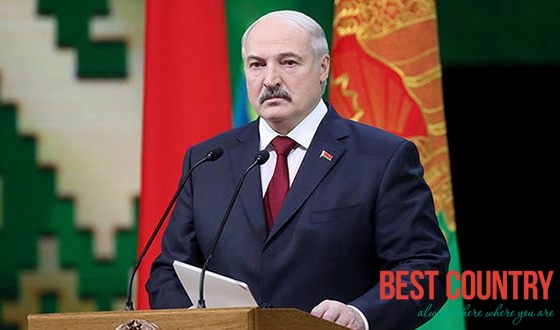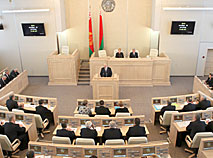In conformity with the Constitution (basic law) of the Republic of Belarus, the Republic of Belarus is a unitary democratic social law-governed state (Article 1 of the Constitution). In line with Article 8 of the Constitution, the Republic of Belarus shall recognize the supremacy of the universally acknowledged principles of international law and ensure that its laws comply with such principles.
Political Structure
Foreign nationals and stateless persons on the territory of Belarus shall enjoy rights and liberties and execute duties on equal terms with the citizens of the Republic of Belarus, unless otherwise specified in the Constitution, the laws and international treaties (Article 11 of the Constitution).
State power in the Republic of Belarus is exercised on the principle of division of powers between the legislature, executive and judiciary.
Belarus is a presidential republic.
The President of the Republic of Belarus is the Head of State, the guarantor of the Constitution of the Republic of Belarus, the rights and liberties of man and citizen.
 Any citizen of the Republic of Belarus by birth at least 35 years of age who is eligible to vote and has been resident in the Republic of Belarus for at least ten years before the elections may be elected President.
Any citizen of the Republic of Belarus by birth at least 35 years of age who is eligible to vote and has been resident in the Republic of Belarus for at least ten years before the elections may be elected President.
The incumbent President of the Republic of Belarus is Alexander Grigoryevich Lukashenko. On 30 September 2019 he was re-elected to the post for the six time.
Parliament
 The National Assembly of the Republic of Belarus is a representative and legislative body. It consists of two chambers: the House of Representatives (110 seats) and the Council of the Republic (64 members). Belarus is among the top eight countries where women hold 30 percent of the seats in the lower chamber of parliament.
The National Assembly of the Republic of Belarus is a representative and legislative body. It consists of two chambers: the House of Representatives (110 seats) and the Council of the Republic (64 members). Belarus is among the top eight countries where women hold 30 percent of the seats in the lower chamber of parliament.
Government
The government is the Council of Ministers of the Republic headed by the Prime Minister.
Local government and self-government. Citizens exercise local government and self-government through local councils of deputies, bodies of public territorial self-government, local referenda, assemblies and other forms of social activity.
Judicial system
Under the Constitution, the judicial power in Belarus belongs to courts. The Constitutional Court supervises the conformity of enforceable enactments to the Constitution.